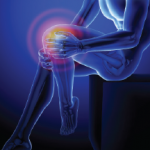For those patients who did not cross over and remained in the physical therapy arm, the change in pain score became similar to those who received surgical intervention between three and 12 months. By 12 months, scores in all three of the as-treated groups were similar.
Some of the patients—9.2% of those randomized to arthroscopic partial meniscectomy and 5.1% of those randomized to physical therapy—underwent total knee replacement over the course of follow up. The participants who ultimately underwent total knee replacement started with the highest KOOS Pain scores and experienced the slowest improvement in pain over the first three months of the study. Although the investigators were unable to identify the cause of this difference, they did document a five-fold increased risk of total knee replacement among those exposed to arthroscopic partial meniscectomy as compared with those treated non-operatively.
“Rheumatologists should be reassured by our findings that pain and function improved considerably for both strategies, with these improvements maintained over five years of follow up. Both strategies—early treatment with arthroscopic partial meniscectomy and physical therapy with the opportunity for delayed arthroscopic partial meniscectomy—are associated with generally favorable outcomes in middle-aged and older persons presenting with knee pain, osteoarthritic changes and degenerative meniscal tear,” says Dr. Collins. “A note of caution is that those subjects undergoing surgery had a slightly increased risk of undergoing total knee replacement.”
He suggests patients and clinicians discuss this risk when contemplating treatment for knee pain, meniscal tear and osteoarthritic changes.
Lara C. Pullen, PhD, is a medical writer based in the Chicago area.
References
- Herrlin SV, Wange PO, Lapidus G, et al. Is arthroscopic surgery beneficial in treating non-traumatic, degenerative medial meniscal tears? A five-year follow up. Knee Surg Sports Traumatol Arthrosc. 2013 Feb;21(2):358–364.
- JN Katz, E Losina, LA MacFarlane, et al. Five-year outcome of operative and non-operative management of meniscal tear in persons greater than 45 years old. Arthritis Rheumatol. 2019 Aug 20. [Epub ahead of print]


